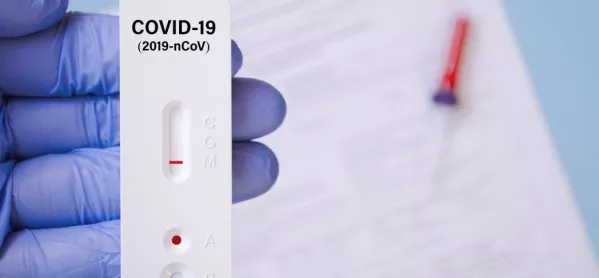Teachers struggle with parents’ consent on Covid tests

Over half of headteachers have said obtaining parents’ consent for school Covid tests has been difficult, according to a new survey.
A poll by the Association of School and College Leaders (ASCL) found that the most common problem headteachers have faced when providing Covid tests to students for the full reopening of schools is getting parental consent for them.
Related: Schools deploy more than 3m rapid Covid tests
Related: School daily teacher and pupil Covid testing ‘paused’
Gavin Williamson: Schools should test staff twice a week
Over half of respondents - 52 per cent - said this had been difficult.
The next most common problems were finding adequate space in schools to set up testing stations and recruiting enough staff to run them, with 43 per cent saying both issues had been a problem.
And less than a fifth - 17 per cent - of heads said they had not faced any challenges.
Current government guidance states that secondary schools and colleges must offer on-site Covid testing to returning pupils, with the first test taking place before they enter the classroom.
It says that the testing and return of pupils can be phased during the first week from 8 March to manage the number passing through the test site at any one time.
The survey of 934 headteachers found that 76 per cent will need to phase the return of students during the course of next week rather than having all students return on Monday.
Most schools needing a phased return will complete this by next week, but 7 per cent of respondents said a phased return would need to continue into the week beginning 15 March.
The survey also found that over half of respondents - 54 per cent - had invited students in for their first test this week to help manage the flow of pupils through testing stations.
The poll also asked respondents about the government’s decision to recommend the extension of face coverings to classrooms for pupils in Year 7 and above.
Six in ten respondents (59 per cent) said they expected that a small number of pupils would refuse to wear face coverings in classrooms, and some (5 per cent) expected that a significant number would refuse to do so.
And 84 per cent said they felt the guidance - which recommends face coverings in classrooms but does not make them mandatory - failed to provide sufficient clarity for schools.
Geoff Barton, general secretary of the Association of School and College Leaders, said: “Our survey shows the massive challenge facing schools and colleges in running a testing programme which involves setting up something that looks like a field hospital and then processing hundreds or thousands of pupils before they return to class.
“The logistics involved mean that many schools will need to phase the return of students. There will be a full return but it will be from - not on - Monday 8 March.
“It is worrying that the biggest problem emerging is the difficulty in obtaining parental consent for Covid tests.
“This is most likely to be simply a matter of oversight with some parents not returning forms and we would urge them to do so.
“There may also be parents who are nervous about testing because they have seen or heard misinformation and we would encourage them to speak to their school if they have concerns. These tests are voluntary but the more they are used, the better the chance of detecting asymptomatic cases.
“Secondary schools and colleges have also been handed the problem of extending the use of face coverings to classrooms, with government guidance that is clearly causing difficulties because it says they are not mandatory but their use must be implemented.
“This leaves schools and colleges in a very difficult position, and our survey shows that many will now have to navigate the difficult terrain of having some students who refuse to wear them.
“We feel that the government has given schools and colleges a hospital pass on testing and face coverings and left them with a logistical and classroom management nightmare which has nothing to do with the core business of education and is inevitably a huge distraction.
“It could and should have provided more support on tests and greater clarity on face coverings.”
You need a Tes subscription to read this article
Subscribe now to read this article and get other subscriber-only content:
- Unlimited access to all Tes magazine content
- Exclusive subscriber-only stories
- Award-winning email newsletters
Already a subscriber? Log in
You need a subscription to read this article
Subscribe now to read this article and get other subscriber-only content, including:
- Unlimited access to all Tes magazine content
- Exclusive subscriber-only stories
- Award-winning email newsletters
topics in this article



